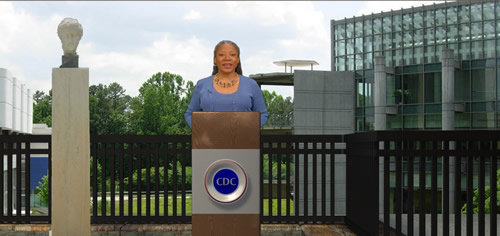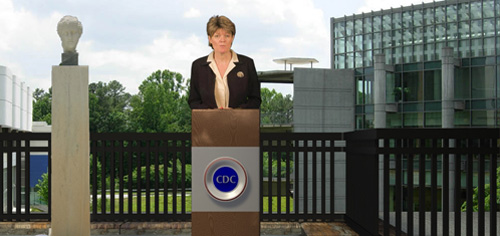State of CDC - Guest Speakers

Hi, I′m Donna Garland, Chief of Enterprise Communication for the Centers for Disease Control and Prevention. I would like to share with you today about Hygeia, and what significance she holds for the work of CDC.
In Greek mythology, Hygeia was the Goddess of Health, and was associated with the prevention of sickness and the promotion of good health. In fact, the word hygiene, which is the science of protecting health, is derived from her name.
In 1969, John Skandalakis, a surgeon and native of Greece, commissioned a sculpture of Hygeia in recognition of CDC′s efforts to carry the torch of health promotion to the world. This remarkable gift was sculpted in Athens and was officially presented to CDC on December 17, 1970.
Today, Hygeia overlooks our main campus, and serves as a symbol and constant reminder of CDC′s work to promote health by preventing and controlling disease, injury, and disability.
I hope you′ll enjoy our State of CDC site, where you′ll find a wealth of information about CDC′s ongoing efforts to achieve “Healthiest Nation” status.

Hi, I′m Dr. Tanja Popovic, CDC′s Chief Science Officer, and today I want to talk to you about Science.
Science is the cornerstone of public health - it is our bridge to health. Science guides CDC in creating knowledge, tools and networks to advance public health practice to improve our society′s health status. It was science that led to breakthroughs such as vaccines, elimination of smallpox, prevention of birth defects, and use of seatbelts that have saved millions of lives. Our scientific findings are so much more than data and statistics - our life—saving science provides hope and inspiration to people and their families, and guides public health actions that improve health and protect lives worldwide.
I am proud to be a CDC scientist and I am immensely proud of the world-class scientists who work across the agency with unparalleled commitment, passion and dedication to saving lives and protecting people′s health.
Today, we face urgent threats—such as climate change, man—made and natural disasters, and pandemic influenza. We also face urgent realities—such as an aging population, an increase in number of adults with multiple chronic conditions and a lack of health equity. Both threats require scientific innovations, development of new interventions, and close collaborations across many societal sectors. Finding solutions is challenging and sometimes the answers cannot come quickly enough. But, I assure you the nation′s best scientists at CDC are on the job with a clear focus of guarding people′s health and being our bridge to a healthier nation.
Related Links
State of CDC
Contact Us:
- Centers for Disease Control and Prevention
1600 Clifton Rd
Atlanta, GA 30333 - 800-CDC-INFO
(800-232-4636)
TTY: (888) 232-6348
24 Hours/Every Day - cdcinfo@cdc.gov

